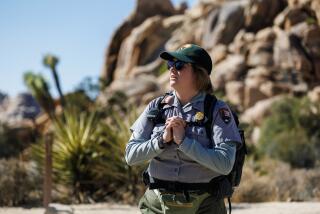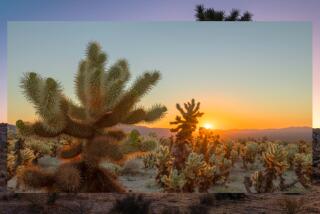Deep in the Jungle, He Hears Roar of Paradise
For some reason, it had never occurred to me that it might be raining in a rain forest. I knew it rained at one time or another, which is why they call it a rain forest, but I never expected it to rain with me actually in it. It wasn’t until we were slogging through the jungle entanglements of Panama’s Chagres National Park and it began pouring that I realized it could rain whenever it pleased, which it did with great frequency.
My second misconception regarding rain forests was that I thought I would be seeing them from the glass-enclosed top deck of a luxurious air-conditioned bus, while a guide pointed out interesting features through a PA system. Wrong again. Had I known we would be in the forests themselves trying to make our way through thick growths of vines and trees and ferns and palms in storms that rattled the world with lightning and thunder, I might not have mentioned Panama.
To backtrack a bit, we were itching for someplace to get away for a while when I suggested Panama. I was thinking of a trip through the canal, a city tour, dinner at fine restaurants, sunny days on tropical beaches and that luxury ride through forests alive with harpy eagles and howler monkeys.
The first few days were pretty much what I’d anticipated, but then came the rain forests, which my wife, the explorer/adventurer/death-defying Cinelli, could hardly wait to enter. I knew it wouldn’t be a bus ride in the park when our guide, Peter Garcia, pointed to a log at the shore of Madden Lake and said, “Climb aboard!”
“That’s a tree,” I said.
“It’s a dugout canoe,” Peter explained.
“Isn’t this great!” Cinelli said.
Oh, my God.
I had never ridden in a tree before, and though I got wet, it took us to where we wanted to go, which was at the edge of the jungle itself. Being dry really wasn’t an option in Panama at that time of year. Not only was it the rainy season, but the humidity itself was at the drenching level every day, storm or no storm.
We hiked up yellow-clay trails as slick as ice, crossed knee-deep stream beds and plowed through thickets where, I’m sure, snakes and jaguars watched our every move. Panama supposedly has more kinds of birds than anyplace else in the world, but I never saw one. Peter shouted, “Look, a toucan!” gesturing toward the forest beyond the stream. I ooohed and aaahed but later admitted to Cinelli I hadn’t seen anything. I was just trying to please Peter.
After what seemed like hours, we reached our destination, which was a waterfall. If you’ve ever seen more than one waterfall, you know there’s not a lot of difference between them. A waterfall is a waterfall is a waterfall. Big deal. Let’s go back.
Going back meant crossing the lake again, this time in a sudden storm. Lightning struck all around us. Thunder roared. Peter stayed calm, Cinelli loved it and I waited patiently to die.
We made it to a village of Empera Indians, where we were greeted by half-naked people whose ways hadn’t changed for thousands of years. I’ve seen topless women before, but never in a rain forest. It was a new experience. They fed us fish in a large, one-room cabana where, Peter explained, “They ate, slept and procreated.” Although not, of course, at the same time.
Having survived that, Cinelli, now stimulated by her jungle challenge, wanted to fly to one of the nearby San Blas islands in the Caribbean to experience other feats of human endurance. I fought it for two reasons. I think of small planes the way I think of dugout canoes. Neither is actually meant as an instrument of human transportation. Also, we would have to fly through thunderheads that ate small planes.
Peter suggested instead a lodge in the jungle called Burbayar, which means “spirit of the forest” in the language of the Kuna Indians. Owned by a Basque who calls himself Inaki, it consists of a series of cabanas on about 100 acres of land at the edge of the Nargana Forest, a pristine area protected by both the government of Panama and the Kunas. The jungle embraces Burbayar as its own.
The idea of a lodge pleased me, and the idea of more jungle pleased Cinelli. The only way to reach Burbayar was in a four-wheel-drive vehicle on a strip of land that defied the term “road.” For an hour, we bounced over ruts as deep as chasms and slid to the edges of jungle cliffs that dropped into green oblivion. Getting to Burbayar was the emotional equivalent of reaching an outpost in Antarctica.
It was worth it. We slept in individual thatched-roof cabanas that overlooked the forest and gloried in the peace that lay like soft music over the lodge. The rain whispered rather than roared. The jungle glistened. We hiked through a rain forest again, but by now I was able to perceive its beauty and not its peril. When it came time to leave, after three days of deep serenity, I realized we had journeyed to Paradise.
I hear the jungle calling even as I write, a dream place very deep inside of me.
*
Al Martinez’s column appears Mondays and Thursdays. He can be reached at [email protected].
More to Read
Sign up for The Wild
We’ll help you find the best places to hike, bike and run, as well as the perfect silent spots for meditation and yoga.
You may occasionally receive promotional content from the Los Angeles Times.






